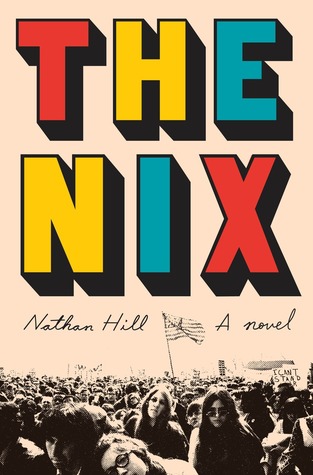
Nathan Hill's decade-in-the-writing debut The Nix is a densely packed novel, to the point that some might call it overstuffed. At 640 pages, cut down from the original (longhand!) 1,200 page version, Hill has a lot to say … and he says much of it very well.
Samuel Andresen-Anderson is a college professor who has aged out of being a promising young author and into a thirty something disappointment in breach of his book contract. When his 23 years absent mother reappears in the national news for assaulting a presidential candidate, Samuel must grapple with decades of generational trauma and the possibility of losing his home and livelihood to a market increasingly indifferent to those not prodigiously wealthy.
Samuel's story is markedly less interesting than his mother's, and that's built in to the book: his life is most vital in the lead up to his abandonment; Faye's in her own childhood and adolescence. Hill's theme of the sins of parents being visited upon their children is strong, and Faye is the lynchpin between her own father's generation and her son. The Nix is a book that delights as it unfolds because Hill is keen not necessarily to rehabilitate his characters but to make the reader understand them. If Samuel is often something of a cypher, it's because his mother made him that way. As the structure dovetails, and Hill reveals the depths of his affection for his subjects, The Nix begins to pay off emotionally as well as humorously.
Because The Nix is often a very funny book, delivering multiple tours de force from supporting characters. Samuel's publisher, Guy Periwinkle, holds court at length about the most inane things, but these are the reasons he is a wealthy guy: "you have got to represent!†Laura Potsdam, Samuel's student who believes she shouldn't be punished for submitting a plagiarised essay that she had also used in high school because of double jeopardy laws, is an acutely realised caricature of a person who expends more energy avoiding work than she would by doing it. In these instances the satire is crisp, pure, and refreshing. Hill can go on multiple page tangents without taking a breath — literally, in the case of Ari Fliakos' audiobook narration.
Despite its frequent hilarity, not all of Hill's targets are equal. Hill muddies Laura's waters by going for the softer target of academia and the concept of "safe spacesâ€, which are wonkily defined between these pages, particularly in light of Hill's own academic background.Â
The World of Elfscape material is particularly strange, as Hill is a man who had a World of Warcraft account in the early-to-mid 2000s; you would think he would have designed a game with a better UI than the cleary janky one that the elves have to contend with. Falling down one of Samuel's Elfscape guild peers Pwnage's multiple rabbit holes of minutia makes one wonder how a game can be played with a many-buttoned gaming mouse and 104-key Western keyboard but not, for instance, have hot keys to instantly equip weapons so that an elf won't be slaughtered by an ambushing orc.
Knowing Hill's real world experiences in both academia and MMORPGs, you would expect that he would have made his satire more pointed rather than soft balling easy targets; the Pwnage segments are the novel's test, telling the reader either things that they already know, but better, or that they will literally never care about, at length. Pwnage is endearing in his own way, and his inertia is often more relatable than Samuel's own, but the level of endurance required to surmount his chapters is intimidating in a book as long as The Nix.
Ironically for a novel that spans World War II to 2011, the most dated element of The Nix is the incorporation of Occupy Wall Street, which has overall left little cultural impact on society. The concept of the 99% versus the 1% has been absorbed into the wider discourse (with mixed success at best), but the idea of people drumming incessantly in a park seems far more foreign and distant than the 1968 DNC riots that inform much of the story's backbone. The Global Financial Crises already seem like burst bubbles from which nothing was learned, and The Nix feels like a tourist visiting the ruins a few years too late; if Hill had not tried to tie his final thesis to these recent but careworn events, he could have stuck the landing that much more firmly.
The Nix is a curious novel with an excellent cover, and in audiobook form most of its characters are expertly given life by Ari Fliakos, but it doesn't hit entirely. There are threads that dangle, and threads that are tied up neatly without quite the sharp bite that Hill was going for. What The Nix has working for it is its through lines: the Faye Andresen storyline itself could and perhaps should have supported a novel alone, and it is her conclusion that provides the most satisfaction in a novel dotted with victories and defeats that both amuse and arrest the mind. For its multiple strengths, you're willing to forgive The Nix its occasional misstep, its unending passages of technical detail designed to make even the most ludologically minded's eyes glaze over. The Nix is a novel that goes for the heart, the mind, and the humours, and it hits those targets more often than not.


